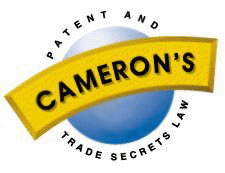
Technograph Printed Circuits Ltd. v.
Mills & Rockley (Electronics) Ltd.
citation(s): [1972] R.P.C. 346 (per Lord Reid)
 |
Technograph Printed Circuits Ltd. v.
|
copyright 2017 Donald M. Cameron, Bereskin & Parr LLP
At p. 355:The question of novelty or anticipation was raised but clearly there is no single prior document which can be regarded as an anticipation of this invention. The real question is whether the respondents have proved "that the invention ... is obvious and does not involve any inventive step having regard to what was known or used, before the priority date of the claim, in the United Kingdom". (Patents Act, 1949, section 32(1)(f)).
To whom must the invention be obvious? It is not disputed that the hypothetical addressee is a skilled technician who is well acquainted with workshop technique and who has carefully read the relevant literature. He is supposed to have an unlimited capacity to assimilate the contents of, it may be, scores of specifications but to be incapable of a scintilla of invention. When dealing with obviousness, unlike novelty, it is permissible to make a "mosaic" out of the relevant documents, but it must be a mosaic which can be put together by an unimaginative man with no inventive capacity.
There is no dispute in the present case as to the documents which he must be supposed to have examined. But in view of some observations which have been made I desire to say that I am very far from being convinced that he must be supposed to have studied every specification or other document which would be relevant on an issue of novelty. I understand that it is now quite common for those seeking guidance to make extensive searches of British and foreign specifications and our hypothetical addressee must be supposed to have done as much research as such persons in fact do. But there may be documents which, although available, would never be looked at by anyone making such a search as our hypothetical addressee is supposed to have made. Attention was drawn to the fact that both heads (e) and (f) in section 32 contain the words "having regard to what was known or used ... in the United Kingdom". I doubt whether they were intended to mean the same in each case. If they were there would now be little, if any, difference between novelty and obviousness. Obviousness would cover practically every case of lack of novelty. In head (e) these words are used in an artificial sense and are held to include matter which in fact no one in the United Kingdom ever knew or was likely to know, such as the contents of some foreign specifications which no one had ever looked at and which the most diligent searcher would probably miss. I think that in head (f) the words should have the more natural meaning of what was or ought to have been known to a diligent searcher.
Return to:
Cameron's IT Law: Home Page; Index
Cameron's Canadian Patent & Trade Secrets Law: Home Page; Index